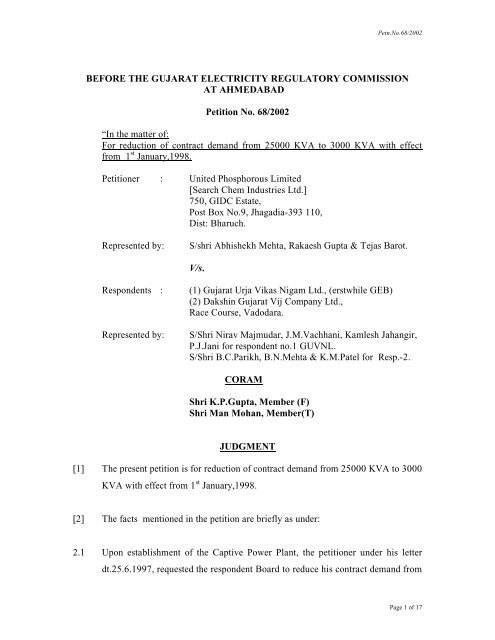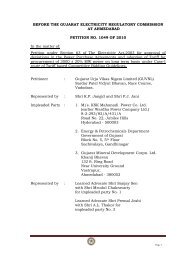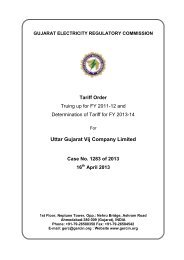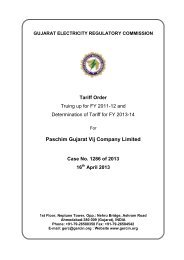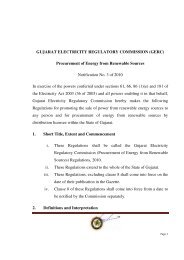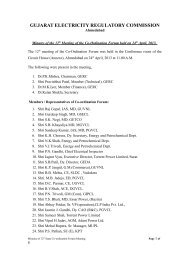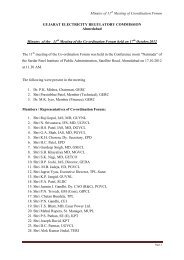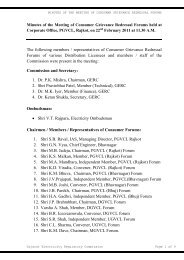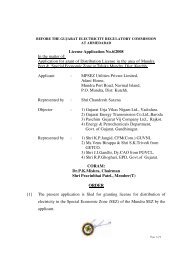Judgment in Pet.68.2002 - GERC
Judgment in Pet.68.2002 - GERC
Judgment in Pet.68.2002 - GERC
You also want an ePaper? Increase the reach of your titles
YUMPU automatically turns print PDFs into web optimized ePapers that Google loves.
Petn.No.68/2002BEFORE THE GUJARAT ELECTRICITY REGULATORY COMMISSIONAT AHMEDABADPetition No. 68/2002“In the matter of:For reduction of contract demand from 25000 KVA to 3000 KVA with effectfrom 1 st January,1998.Petitioner : United Phosphorous Limited[Search Chem Industries Ltd.]750, GIDC Estate,Post Box No.9, Jhagadia-393 110,Dist: Bharuch.Represented by:S/shri Abhishekh Mehta, Rakaesh Gupta & Tejas Barot.V/s.Respondents :Represented by:(1) Gujarat Urja Vikas Nigam Ltd., (erstwhile GEB)(2) Daksh<strong>in</strong> Gujarat Vij Company Ltd.,Race Course, Vadodara.S/Shri Nirav Majmudar, J.M.Vachhani, Kamlesh Jahangir,P.J.Jani for respondent no.1 GUVNL.S/Shri B.C.Parikh, B.N.Mehta & K.M.Patel for Resp.-2.CORAMShri K.P.Gupta, Member (F)Shri Man Mohan, Member(T)JUDGMENT[1] The present petition is for reduction of contract demand from 25000 KVA to 3000KVA with effect from 1 st January,1998.[2] The facts mentioned <strong>in</strong> the petition are briefly as under:2.1 Upon establishment of the Captive Power Plant, the petitioner under his letterdt.25.6.1997, requested the respondent Board to reduce his contract demand fromPage 1 of 17
Petn.No.68/200225000 KVA to 3000 KVA. The Board, however, under its letter dt.15.7.1997<strong>in</strong>formed the petitioner that he should approach the Board for reduction <strong>in</strong>contract demand on completion of the two year period of agreement i.e. after31.12.1997. The petitioner therefore once aga<strong>in</strong> approached the Board forreduction <strong>in</strong> contract demand from 1.1.1998. The Board, however, kept<strong>in</strong>explicable silence. The petitioner understands that dur<strong>in</strong>g those days, the policyon captive power plants was under consideration of the Government of Gujarat.The petitioner therefore, approached the Govt. of Gujarat, Energy &Petrochemicals Department to give appropriate provisional directions to theBoard until the formal Captive Power Policy of the state was announced. TheGovt.of Gujarat under its letter dt.2.7.1998 addressed to the Board permittedwheel<strong>in</strong>g of power from captive power plant to group companies as well as to theown company at different locations and further directed that as aga<strong>in</strong>st theexist<strong>in</strong>g contract demand of 25000 KVA, the petitioner would pay as per reducedcontract demand of 6250 KVA. This arrangement was to be made effective from22.6.1998. Pursuant to the said direction of the Government, the Board under itsletter dated 18.7.1998 advised the petitioner that its contract demand standstemporarily reduced as a stop gap arrangement on ad hoc basis from 25000 KVAto 6250 KVA from 22.6.1998. Thereafter the Govt. of Gujarat announced thePolicy for Supply of Surplus Electrical Power to Group Companies &GEB/Licensees, Wheel<strong>in</strong>g of power, etc. by Captive Power Projects under Energy& Petrochemicals Deptt. Resolution No.CCP 1197/2263/PP Cell dated 9.11.1998.As per para 10 of the said resolution, all ad hoc arrangements allowed forwheel<strong>in</strong>g and reduction of contract demand were required to be regularized <strong>in</strong>accordance with the provisions conta<strong>in</strong>ed <strong>in</strong> the said resolution. Even though theBoard accepted reduction <strong>in</strong> contract demand from 22.6.1998, the petitionerreceived a letter dt.12.5.1999 <strong>in</strong> which the respondent Board took a U-turn andstated that its earlier decision of giv<strong>in</strong>g effect to reduction <strong>in</strong> demand from22.6.1998 was not correct and it has s<strong>in</strong>ce been reviewed and that the reduction <strong>in</strong>contract demand would be effective from 9.11.1998 the date on which thePage 2 of 17
Petn.No.68/2002Government announced its Captive Power Policy and not from 22.6.1998 asdecided earlier. It is the say of the petitioner that the approach of the Board be<strong>in</strong>gtotally unjust, the petitioner once aga<strong>in</strong> submitted a representation to therespondent on 24.5.1999 and to the Addl. Chief Secretary to the Govt. of Gujarat,Energy & Petrochemicals Department under its letters both dated 24.8.1999po<strong>in</strong>t<strong>in</strong>g that the petitioner had requested for reduction <strong>in</strong> contract demand from1.1.1998 <strong>in</strong> light of the then exist<strong>in</strong>g policy dated 22.12.1997. It may be open tothe Government to revise the policy from time to time but the petitioner who hadacted on the extant policy should not be adversely affected because of suchrevision, which <strong>in</strong> all fairness should be prospective. The petitioner was with<strong>in</strong> hisrights to request for reduction <strong>in</strong> contract demand from 1.1.1998 <strong>in</strong> terms ofpolicy dt.22.12.1997 and therefore, the Board ought to have given effect from1.1.1998 itself. The Board, however, did not accede to this just and reasonablerequest of the petitioner and rejected the request and the effect was given from9.11.1998, viz. the date of the Government Resolution, regardless of what wasresolved by the Government <strong>in</strong> para 10 thereof.2.2 The respondent has been prompted <strong>in</strong> rais<strong>in</strong>g a bill of astronomical figure ofRs.1,45,70,832.58 towards the differential contract demand charges from22.6.1998 to 9.11.1998 as accord<strong>in</strong>g to the respondent, the CPP Policy announcedby the Government is not retrospective and therefore the contract demand wouldnot stand reduced from 22.6.1998 regardless of the fact that it already stoodreduced with effect from 22.6.1998 on ad hoc basis and the Jo<strong>in</strong>t Secretary to theGovernment of Gujarat, Energy & Petrochemicals Department, also advised therespondent that ad hoc arrangements which were already allowed were to beregularized <strong>in</strong> light of the new CPP Policy. It would <strong>in</strong>deed be unreasonable andunrealistic that although both <strong>in</strong> practical and technical terms the contract demandwas effectively reduced from 22.6.1998, yet that fact should be ignored onlybecause the announcement of the new CPP Policy took some time and it came tobe announced from 9.11.1998. It is the submission of the petitioner that the BoardPage 3 of 17
Petn.No.68/2002ought to have agreed to reduce contract demand with effect from 1.1.1998 afterexpiry of the period of agreement on 31.12.1997. The decision of the Board is<strong>in</strong>compatible with and contrary to the Government’s power policy with regard tothe captive power plants. The Board ought to have appreciated that the petitioner,(which <strong>in</strong>stalled the captive power plant) <strong>in</strong> fact augmented the power generation<strong>in</strong> the State of Gujarat right <strong>in</strong> the period when Gujarat was fac<strong>in</strong>g acute powershortage, and by runn<strong>in</strong>g the <strong>in</strong>dustry with the help of captive power plant, hasalso generated additional manufactur<strong>in</strong>g capacity and a perennial source ofrevenue to the Government earned on sale of its products and has also generatedemployment opportunities. Therefore, it is prayed by the petitioner to declare thebill dt.27.8.1999 for Rs.1,45,70,832.58 raised by the respondent Board as null andvoid. The petitioner has also prayed to give effect of reduction <strong>in</strong> contract demandfrom 25000 KVA to 3000 KVA with effect from 1.1.1998 with consequentialrelief <strong>in</strong> energy bills from 1.1.1998 onwards. Alternatively, the petitioner hasprayed to give effect of reduction <strong>in</strong> contract demand from 25000 KVA to 6250KVA with effect from 22.6.1998.[3] The Commission issued notice to the respondent and the respondent (GEB) filed areply contend<strong>in</strong>g <strong>in</strong>ter alia that the GEB had already taken a stand to the effectthat <strong>in</strong>itially the petitioner consumer was hav<strong>in</strong>g contractual demand of 25000KVA. However, the said contractual demand was sought to be reduced by thepetitioner and accord<strong>in</strong>gly, the petitioner approached the Government request<strong>in</strong>gthem to permit the petitioner to reduce the contractual demand to 6250 KVA from25000 KVA. At the relevant time, the CPP Policy was not <strong>in</strong> existence, but theprocedure of formation/ f<strong>in</strong>alization of CPP Policy was <strong>in</strong> progress and theGovernment authorities were pleased to grant permission by communicationdt.2.7.1998 and on ad hoc basis, <strong>in</strong>terim arrangement came to be made and loadreduction permission came to be granted on absolutely stop gap arrangement andthat too, subject to f<strong>in</strong>alization of CPP Policy. It was also made clear that ifultimately the CPP policy prescribed other way round, then the petitioner willPage 4 of 17
Petn.No.68/2002have to pay additional charges of difference <strong>in</strong> this regard with 15% <strong>in</strong>terest.Ultimately, the CPP policy came <strong>in</strong>to existence on 9.11.1998. As per the saidpolicy, the petitioner had become entitled to get the benefit of load reduction by75% of the contractual demand. The said policy came to be <strong>in</strong>troduced on9.11.1998 and therefore, the said policy could not have retrospective effect. Infact, the load reduction came to be granted by <strong>in</strong>terim arrangement and, therefore,from 22.6.1998 to 9.11.1998, the petitioner became liable to make paymenttowards load reduction. Even the CPP policy was made effective from 9.11.1998and load reduction permission was granted as an <strong>in</strong>terim arrangement and theultimate decision <strong>in</strong> this regard was made subject to the CPP policy. It is statedthat had the policy been given retrospective effect, then naturally the petitionerwould have become entitled to get the advantage. But admittedly, the policy is notgiven retrospective effect and, therefore, dur<strong>in</strong>g the aforesaid period, even <strong>in</strong>respect of load reduction which was absolutely an <strong>in</strong>terim arrangement whichcould not have been treated as full-fledged permission granted by the authoritiesand, therefore, the petitioner became entitled to make payment. The respondenthas further submitted that the GEB authorities have already <strong>in</strong>voked provisions ofSection 9 of the Civil Procedure Code by way of preferr<strong>in</strong>g a suit <strong>in</strong> the court ofLearned Civil Judge (S.D.), Bharuch for recovery of the amount of the bill whichis the subject matter of challenge before this Commission and, therefore, <strong>in</strong> viewof the aforesaid facts and circumstances of the case, s<strong>in</strong>ce the suit is filed and ispend<strong>in</strong>g before the competent authority, this Commission may not enterta<strong>in</strong> thepresent application and the same deserves to be dismissed with costs.3.1 The respondent has further submitted that if the present petitioner’s prayer isaccepted, then it would impose burden of more than Rs.46 crores upon the GEBexchequer and other similarly situated number of CPP consumers would also rushbefore the GEB and therefore also, it is prayed that s<strong>in</strong>ce the petitioner is notlegally entitled to get any relief, no <strong>in</strong>dulgence be shown and the presentapplication be dismissed. Any order which may be passed by the CommissionPage 5 of 17
Petn.No.68/2002may affect the prospects of the Civil suit and, therefore also, this applicationdeserves to be dismissed.[4] The petitions were kept for hear<strong>in</strong>g on 15.3.2002 and the Commission had heardLearned Addl. Advocate General Mr.Kamal Trivedi for some times and thereafterCommission ordered to issue notice to the GEB.[5] Thereafter the petitions were kept for hear<strong>in</strong>g on 21.6.2002, but Ld. Counsel forthe applicant was not present and Ld. Counsel Mr.Nirav Majmudar made astatement that he shall be fil<strong>in</strong>g his appearance <strong>in</strong> these group of matters andmatter was adjourned.[6] Thereafter the petitions were kept for hear<strong>in</strong>g on 3.9.2002. On that day, theLearned Counsel Mr.Nirav Majmudar, who appeared on behalf of GEB asked forsome time as the last opportunity for fil<strong>in</strong>g affidavit. Ld. Counsel Mr.RakeshGupta who appeared on behalf of M/s.Trivedi & Gupta for the petitioner, had noobjection for grant<strong>in</strong>g a reasonable period and therefore, time was granted.[7] Thereafter the petitions were kept for hear<strong>in</strong>g on 18.9.2002 and on that date, asper the request of Mr.Hemant Gohedia, who was present on behalf of LearnedCounsel Mr.Nirav Majmudar, time was granted.[8] Thereafter the Commission suggested for amicable settlement but it could not bedone and therefore, the petition was kept for hear<strong>in</strong>g on 25.2.2005. On that day,the Learned Advocate Shri Nirav Majmudar, represent<strong>in</strong>g GEB submitted that thematter is sub-judice as the petitioner had already approached the Hon’ble HighCourt of Gujarat on the same subject matter and the petitioner has also obta<strong>in</strong>ed<strong>in</strong>terim order restra<strong>in</strong><strong>in</strong>g the GEB from mak<strong>in</strong>g adjustment <strong>in</strong> the bill. Therefore,petitioner should submit the correct position of the subject matter before theCommission. The Learned Advocate Shri Rakesh Gupta submitted that <strong>in</strong> fact, thePage 6 of 17
Petn.No.68/2002petitioner had approached the Hon’ble High Court of Gujarat only aga<strong>in</strong>st theillegal adjustment <strong>in</strong> the bills but <strong>in</strong> fact, the matter is not sub-judice.[9] The Hon’ble High Court of Gujarat has passed order <strong>in</strong> Civil ApplicationNo.1517 of 2005 <strong>in</strong> SCA No.7213 of 2004 as under:-“Under the circumstances, it will be just and proper to clarify that there is no stayaga<strong>in</strong>st proceed<strong>in</strong>g further with the petition no.68 of 2002 pend<strong>in</strong>g before theGujarat Electricity Regulatory Commission. On the contrary, it will be <strong>in</strong> <strong>in</strong>terestof justice that Petition No.68/2002 pend<strong>in</strong>g before the Commission is decided anddisposed of by the commission. As agreed between the parties, the commissionmay cont<strong>in</strong>ue with the hear<strong>in</strong>g of the Petition No.68/2002 and f<strong>in</strong>al decisionwhich would be rendered by the Regulatory Commission <strong>in</strong> Petition No.68 of2002, the same may not be implemented without prior permission of this Courtand the decision that may be rendered by the Gujarat Electricity RegulatoryCommission be placed on record before this Court <strong>in</strong> the present Special CivilApplication i.e. SCA No.7213 of 2004 and appropriate application may be movedby either party for implementation of such order which may be considered at thetime of hear<strong>in</strong>g of the ma<strong>in</strong> special civil application.”[10] In view of above order of the Hon’ble High Court of Gujarat, the petition waskept for hear<strong>in</strong>g on 12.5.2005. It came to the notice of the commission that theEnergy & Petrochemicals Deptt. Govt. of Gujarat, has addressed a letter to theMember (F<strong>in</strong>), GEB, Baroda on 28.10.1999 on the subject of reduction <strong>in</strong> contractdemand and it is mentioned <strong>in</strong> the said letter as under:“M/s. Search Chem Industries Ltd. had requested for reduction <strong>in</strong> contractdemand. The State Government have passed the orders on 22.6.98 to allowreduction <strong>in</strong> contract demand from 25000 KVA to 6250 KVA on adhoc basisw.e.f. 22.6.98 subject to condition that the reduction will be regularized <strong>in</strong>Page 7 of 17
Petn.No.68/2002accordance with the f<strong>in</strong>al policy that may be decided by the State Governmentabout Captive Power Plant. Subsequently, the State Government has f<strong>in</strong>alized theCPP policy vide G.R.No.CPP-1197-2253-PP Cell dated 9.11.98. As per the clauseno.10 of the G.R. all the adhoc arrangements allowed for wheel<strong>in</strong>g and reductionof contract demand shall be regularized <strong>in</strong> accordance with the provisionsconta<strong>in</strong>ed <strong>in</strong> the resolution.”[11] Thereafter the petition was kept for hear<strong>in</strong>g on 9.3.2006. On that day, LearnedAdvocate S/Shri Abhishek Mehta and Rakesh Gupta for Trivedi & Gupta andShri B.K.Anand, DGM were present on behalf of the petitioners. S/ShriJ.M.Vachhani, Kamlesh Jahangir, P.J.Jani were present on behalf of GUVNL,S/Shri B.N.Mehta, K.M.Patel were present on behalf of DGVCL. LearnedAdvocate Shri Nirav Majmudar was present on behalf of all the unbundledcompanies (of erstwhile GEB) at the time of hear<strong>in</strong>g.11.1 Learned Advocate Shri Rakesh Gupta reiterated the facts mentioned <strong>in</strong> thepetition. He specifically <strong>in</strong>vited our attention to the letter dt.2.7.1998 of Energy &Petrochemicals Deptt., Gandh<strong>in</strong>agar, where<strong>in</strong> the permission for wheel<strong>in</strong>g wasallowed subject to the follow<strong>in</strong>g terms and conditions:1) “GEB should prepare the bill as per the exist<strong>in</strong>g contract demand of 25000KVA. However, <strong>in</strong>dustry would pay as per the reduced contract demand of6250 KVA.”The above temporary stop gap ad-hoc arrangement shall be effective from22.6.1998. It is further clarified that difference amount between bill as perexist<strong>in</strong>g contract demand and that as per the reduced contract demand should betreated as deferred amount without any penal <strong>in</strong>terest. The difference <strong>in</strong> amountfor System Losses and wheel<strong>in</strong>g charges, if any, ultimately to be decided as perthe Captive Power Policy to be issued by the Government will also be payablePage 8 of 17
Petn.No.68/2002along with the difference <strong>in</strong> the demand charges, if any, with<strong>in</strong> the period equal tothe time lapsed between this ad-hoc arrangement and the f<strong>in</strong>al policy with <strong>in</strong>terestat the rate of 15% per annum.11.2 He also <strong>in</strong>vited our attention to Clause 10 of Guidel<strong>in</strong>es for Captive PowerProjects dated 22.12.1997 which is reproduced below:“10. Contract DemandThe reduction of contract demand of the consumer would be permitted upto 25%of orig<strong>in</strong>al contract demand if consumers <strong>in</strong>tend to have parallel operation.However, contract demand would not be necessary/ would not be <strong>in</strong>sisted upon ifCPP <strong>in</strong>tends operation on isolated and stand alone basis. Any drawl of powerfrom the State Grid by the <strong>in</strong>dustrial unit would be subjected to HTP I tariff ofGEB. “In the light of above, Shri Rakesh Gupta argued that the aforesaid GovernmentResolution dated 22.12.1997 permits the reduction <strong>in</strong> contract demand upto 25%.11.3 He further submitted that there was another issue perta<strong>in</strong><strong>in</strong>g to charges for thepower supplied by the petitioner to the respondent (GEB) was heard by theHon’ble High Court of Gujrat and that issue has been settled by the judgment ofthe Hon’ble High Court. As regards the present issue the Hon’ble High Court <strong>in</strong>the same judgement (SCA 7213 of 2004) has observed as follows :“8.4 In pursuance of the same the Petitioner made various representationswhich did not meet with any positive results. The respondent Board thereafterraised a demand for a sum of Rs. 1.25 crores purport<strong>in</strong>g to be towards thedemand charges for the period from 22.6.1998 to 9.11.1998. Ultimately thepetitioner company approached the Gujarat Electricity Regulatory Commission(<strong>GERC</strong>) which is registered as Case No. 68/2002. The said case is still pend<strong>in</strong>gPage 9 of 17
Petn.No.68/2002before the <strong>GERC</strong>. In short the dispute with regard to the payment of the demandraised by the respondent Board is pend<strong>in</strong>g for adjudication.”In the light of the aforesaid, Shri Rakesh Gupta submitted that the High Court hasnot given any decision on this issue and has observed that it is for theCommission to decide this issue.He further submitted as follows :(i)Dur<strong>in</strong>g the entire period (22.6.1998 – 9.11.1998) the Petitioner’s demandcatered to by GEB was only 6250 KVA and as such they can not charge for25000 KVA.(ii) Clause 10 of the Government CPP Policy dated 9.11.98 states as follows :“All the adhoc arrangements allowed for wheel<strong>in</strong>g and reduction ofcontract demand shall be regularized <strong>in</strong> accordance with the provisionsconta<strong>in</strong>ed <strong>in</strong> the regulation.”Accord<strong>in</strong>g to Shri Rakesh Gupta, this clause has been specifically <strong>in</strong>serted tofacilitate regularization of adhoc arrangements of reduction <strong>in</strong> contract demandw.e.f. 22.6.1998. If it were to be argued that earlier adhoc arrangements forreduction <strong>in</strong> contract demand were only to be regularized prospectively afterannouncement of this Policy i.e. CPP Policy dated 9.11.98, there was no need tospecifically <strong>in</strong>sert this clause as without this clause also the reduction <strong>in</strong> contractdemand upto a level of 25% (as per clause 8 of this Policy) would have beenpermitted. He argued that accord<strong>in</strong>g to several judgments which he cited <strong>in</strong> thisregard (given below) no provision can be <strong>in</strong>terpreted <strong>in</strong> a way to make itredundant.Page 10 of 17
Petn.No.68/2002(a) AIR 1986 SC 1499(b) IR 1953 SC 394(c) 1992(2) GLR 1006(d) 1983 ELT (54) (P. & H.)(e) AIR 1962 Punjab 74(f) 1990 (49) ELT 127(g) 1984 (15) ELT 25911.4 Learned Advocate Shri N.K.Majmudar submitted that at the relevant time, therewas no policy authoriz<strong>in</strong>g the petitioner to have reduction <strong>in</strong> contract demand.Therefore, the petitioner approached the State Government and ultimately theState Government issued a letter to GEB and the said contract demand of 25000KVA was reduced to 6250 KVA with effect from 22.6.1998. The saidarrangement was temporary stop gap arrangement till the policy <strong>in</strong> this regard wasframed by the State Government. Ultimately, the f<strong>in</strong>al policy came <strong>in</strong>to existence<strong>in</strong> November,1998 and as per the said policy, the petitioner was entitled to havereduction of only 25% of total contract demand and accord<strong>in</strong>gly, the petitionerwas entitled to reduction <strong>in</strong> demand to 6250 KVA from 25000 KVA with effectfrom 9.11.1998, the date on which the policy had come <strong>in</strong>to force. Even the letterof the State Government dt.2.7.1998, makes it clear that the said arrangement ofreduction <strong>in</strong> contract demand and payment on reduced contract demand was atemporary stop gap arrangement and condition was imposed <strong>in</strong> the said letter thatas and when the policy is framed by the State of Gujarat, the difference, if at all,would be paid by the petitioner with 15% <strong>in</strong>terest. In fact, the captive powerpolicy and clause 10 of the policy prescribed that if any adhoc arrangement or<strong>in</strong>dulgence is shown by the Government <strong>in</strong> respect of reduction of contractdemand, then the same may be regularized <strong>in</strong> accordance with the provisions ofpolicy which had come <strong>in</strong>to force <strong>in</strong> November,1998. As per Clause 10, itauthorizes the GEB to regularize the period of ad-hoc arrangement and, therefore,rightly so, the GEB demanded the amount from the petitioner towards differencePage 11 of 17
Petn.No.68/2002of contractual demand s<strong>in</strong>ce the reduction <strong>in</strong> contractual demand is given effectfrom 9.11.1998 and, therefore, the benefit which was given on temporary basispursuant to the letter of the State of Gujarat was absolutely temporary one and,therefore, the difference of demand charges prior to com<strong>in</strong>g <strong>in</strong>to force of the saidpolicy is required to be recovered by the GEB and, therefore, the petitioner hasapproached this Commission at premature stage. The demand by the GEB is <strong>in</strong>consonance with the policy and, therefore, the petition should be dismissed.[12] Thereafter the petition was kept for hear<strong>in</strong>g on 26.7.2006. On that day, theLearned Advocate S/Shri Abhishek Mehta and Rakesh Gupta for Trivedi & Guptawere present on behalf of the petitioner. S/Shri J.M.Vachhani, Kamlesh Jahangir,P.J.Jani were present on behalf of GUVNL, S/Shri K.M.Patel, T.D.Davada andJ.J.Gandhi were present on behalf of DGVCL. The Learned Advocate Shri NiravMajmudar was present on behalf of all the unbundled companies (erstwhile GEB).Shri D.D.Halpati, Dy.Section Officer, Energy & Petrochemicals Deptt.,Government of Gujarat, Gandh<strong>in</strong>agar was present on behalf of the Government atthe time of hear<strong>in</strong>g.12.1 Shri D.D.Halpati submitted adjournment application stat<strong>in</strong>g that due to someadm<strong>in</strong>istrative reasons, affidavit or reference from Government could not be filedand therefore, he requested that adjournment may be granted for fil<strong>in</strong>g a referencebefore the Commission.12.2 The Learned Advocate Shri Nirav Majmudar submitted that as per the orderpassed by the Commission, GUVNL has submitted <strong>in</strong>formation regard<strong>in</strong>g othercompanies which had applied for the reduction of contract demand to GEB andthe cases <strong>in</strong> which GEB has granted reduction <strong>in</strong> contract demand. GUVNL havealready filed affidavit with details regard<strong>in</strong>g the companies which had applied forreduction of contract demand and date from which the request for reduction <strong>in</strong>contract demand was granted. He further submitted that the respondent afterPage 12 of 17
Petn.No.68/2002collect<strong>in</strong>g details from all Discoms of GUVNL and after go<strong>in</strong>g through the oldrecords, has submitted the details of CPP units which had demanded reduction <strong>in</strong>contract demand before 9.11.1998 and approval given thereof. Such details weregiven at Annexure-I of the affidavit. He also submitted that only <strong>in</strong> Search Chemcase, there was an ad-hoc arrangement after the expiry of two year contract periodtill the <strong>in</strong>troduction of new policy. As such, it is a different case from others.12.3 Learned Advocate Shri Rakesh Gupta emphasized that only <strong>in</strong> the present case(M/s.Search chem), there was an ad-hoc arrangement which was to be regularizedas per the policy to be made by the Government of Gujarat. He read out thedetails of other cases <strong>in</strong> which reduction <strong>in</strong> contract demand was granted. In oneof the cases i.e. Gujarat Alkali’s case, reduction <strong>in</strong> contract demand was madew.e.f.9.11.1998 by the respondents which was even before the expiry of twoyears stipulation. As such, <strong>in</strong> this case, reduction <strong>in</strong> contract demand was allowedeven before expiry of two years and there was no ad-hoc arrangement like that ofM/s.Search Chem Industries. He also <strong>in</strong>vited our attention to clause 10 of the CPPpolicy and also referred to our oral order dt.9.3.2006. Accord<strong>in</strong>g to him, no clauseshould become redundant while <strong>in</strong>terpret<strong>in</strong>g an order/ policy. In support of hissubmission he cited the Supreme Court Order (1986 SC 1499) and referred toPage 6 of the said judgment.12.4 Reply<strong>in</strong>g to the submission made by the Learned Advocate Shri Rakesh Gupta,Learned Advocate Shri Nirav Majmudar mentioned that as far as Gujarat AlkaliesLtd. is concerned, the reduction <strong>in</strong> contract demand was permitted (w.e.f.9.11.1998) even before expiry of two years period s<strong>in</strong>ce the same was stipulated<strong>in</strong> clause 8 of the CPP Policy of Govt. of Gujarat which took effect on 9.11.1998.As such, there was no deviation from CPP Policy <strong>in</strong> this case. Secondly, <strong>in</strong>respect of M/s.Search Chem, the reduction <strong>in</strong> contract demand was also allowedfrom 9.11.1998 based on the same CPP Policy and accord<strong>in</strong>gly, the GEB hasissued circular for adm<strong>in</strong>istrative guidel<strong>in</strong>es. The clause 10 of the CPP PolicyPage 13 of 17
Petn.No.68/2002does not state that the policy has to be applied with retrospective effect.Regard<strong>in</strong>g the Supreme Court judgment referred to by the Learned Advocate ShriRakesh Gupta, he submitted that it is a matter of <strong>in</strong>terpretation and the court maydepart from the pla<strong>in</strong> read<strong>in</strong>g. In the present case, clause 10 requires to beconsidered for <strong>in</strong>terpretation.[13] Thereafter, the petition was kept for hear<strong>in</strong>g on 10.8.2006. On that day, LearnedAdvocate Shri Abhishek Mehta for Trivedi & Gupta was present on behalf of thepetitioner. Learned Advocate Shri S.J.Nayak for Advocate Shri N.K.Majmudarwas present on behalf of GUVNL. Nobody rema<strong>in</strong>ed present for DGVCL &Government of Gujarat.13.1 The Commission had received a fax from GUVNL for adjourn<strong>in</strong>g the hear<strong>in</strong>g ofthe above petition, s<strong>in</strong>ce the concerned officers had to attend meet<strong>in</strong>g of UltraMega Power Project at New Delhi and hear<strong>in</strong>g at the Appellate Tribunal forElectricity on 10.8.2006 at New Delhi. We found that full opportunity of be<strong>in</strong>gheard should be given to the parties. Hence, we granted adjournment <strong>in</strong> the<strong>in</strong>terest of justice.13.2 The Government had not filed affidavit regard<strong>in</strong>g details of CPP Policy. Hence,we directed the Government of Gujarat to file affidavit regard<strong>in</strong>g details of CPPPolicy on or before 22.8.2006 by furnish<strong>in</strong>g a copy of the same to the petitioner aswell as GUVNL and DGVCL.[14] Thereafter, the petition was kept for hear<strong>in</strong>g on 22.8.2006. On that day, LearnedAdvocate Shri Abhishek Mehta for Trivedi & Gupta was present on behalf of thepetitioner. Learned Advocate S/Shri N.K.Majmudar and S.J.Nayak were presenton behalf of GUVNL along with Shri J.M.Vachhani, Ex.Eng<strong>in</strong>eer and ShriP.J.Jani, Dy.Eng<strong>in</strong>eer from GUVNL . S/Shri K.M.Patel, Dy.Eng<strong>in</strong>eer andPage 14 of 17
Petn.No.68/2002K.P.Jangid were present on behalf of DGVCL. Nobody rema<strong>in</strong>ed present forGovernment of Gujarat.14.1 The Commission vide its oral order dated 9 th March,2006 (followed by 26 th Julyand 10 th August,2006) directed the Govt. of Gujarat for fil<strong>in</strong>g affidavit regard<strong>in</strong>gdetails of CPP policy and clarification regard<strong>in</strong>g effective date of reduction <strong>in</strong>contract demand with reference to clause 10 of CPP Policy and Govt. of Gujarat,Energy & Petrochemical Department’s Letter (No.CPP-1198-396-PP Cell) dated2.7.1998 But the Government did not file the affidavit. Hence, we aga<strong>in</strong> directedthe Government of Gujarat to file the affidavit on or before 19.9.2006 and furnisha copy of the same to the petitioner as well as GUVNL and DGVCL fail<strong>in</strong>g whichit would be presumed that GoG have noth<strong>in</strong>g to say <strong>in</strong> the matter and the petitionwould be disposed off <strong>in</strong> accordance with law.[15] Thereafter, the petition was kept for hear<strong>in</strong>g on 19.9.2006. On that day, LearnedAdvocates S/Shri Abhishek Mehta & Rakesh Gupta for Trivedi & Gupta werepresent on behalf of the petitioner. Learned Advocate Shri N.K.Majmudar waspresent on behalf of GUVNL along with Shri J.M.Vachhani, Ex.Eng<strong>in</strong>eer andShri P.J.Jani, Dy.Eng<strong>in</strong>eer from GUVNL . S/Shri K.M.Patel, Dy.Eng<strong>in</strong>eer andD.T.Davda, ACE were present on behalf of DGVCL. Nobody rema<strong>in</strong>ed presentfor Government of Gujarat.15.1 F<strong>in</strong>ally the Under Secretary to the Government, Energy & Petrochemicals Deptt.filed the Affidavit <strong>in</strong> reply on behalf of Government of Gujarat on 5 thSeptember,2006.15.2 The Government of Gujarat clarified <strong>in</strong> its Affidavit that as the Captive PowerPolicy was <strong>in</strong> the pipel<strong>in</strong>e, an adhoc arrangement as envisaged <strong>in</strong> the Government,Energy & Petrochemicals Department letter No.CPP/1198/398/CP celldt.02.7.1998 for wheel<strong>in</strong>g of surplus power through erstwhile GEB network toPage 15 of 17
Petn.No.68/2002M/s.Searchchem’s own units located at Vapi and Ankleshwar, was grantedsubject to the conditions mentioned there<strong>in</strong>. As per the provisions of ConditionNo.1, erstwhile GEB was allowed to bill as per the exist<strong>in</strong>g Contract Demand of25000 KVA, where as the concerned <strong>in</strong>dustry was allowed to pay as per thereduced contract demand of 6250 KVA i.e. 25%. It was clarified <strong>in</strong> the said letterdated 2.7.1998 that this ad-hoc arrangement shall come <strong>in</strong>to force w.e.f. 22.6.1998and rema<strong>in</strong> <strong>in</strong> force till either the recipient company or supply<strong>in</strong>g companycont<strong>in</strong>ues to hold 40% of issued share capital <strong>in</strong> the other company. As decidedby Government, at relevant po<strong>in</strong>t of time, this was an absolutely stop-gap ad-hocarrangement to take care of the long pend<strong>in</strong>g demand of <strong>in</strong>dustry and subject tothe adjustments as per the provisions of f<strong>in</strong>al policy. This decision of theGovernment has also been reflected <strong>in</strong> para 10 of the Captive Power Policyannounced vide Government GR dated 9.11.1998. The same has been repeated <strong>in</strong>the letter dt.28.10.1999, from Jo<strong>in</strong>t Secretary to Government, Energy &Petrochemicals Department addressed to Member (F<strong>in</strong>ance) erstwhile GEB. Asper the provisions of f<strong>in</strong>al policy for captive power, as conta<strong>in</strong>ed under para 8 ofGR dated 9.11.1998, the <strong>in</strong>dustries on commission<strong>in</strong>g of Captive Power Plants,require to be allowed to reduce their exist<strong>in</strong>g contract demand up to a level of25% of their orig<strong>in</strong>al Contract Demand. The reduction <strong>in</strong> Contract Demandallowed to the unit on ad-hoc basis (i.e. upto 25%) is exactly <strong>in</strong> l<strong>in</strong>e of thisprovision. “As per the provisions of Para 10 of the said GR dated 9.11.1998, thead-hoc arrangement sanctioned by Government vide letter dated 2.7.1998 has tobe regularized as per the provisions of the Captive Power Policy-1998 w.e.f.22.6.1998 i.e. from the date of commencement of the ad-hoc arrangement grantedearlier”.[16] In view of letter dt.28.10.1999 and <strong>in</strong> view of Affidavit filed by the Governmentof Gujarat on 6.9.2006, the opponents have to take appropriate action <strong>in</strong> thematter of reduction of contract demand. It is clear from the above letter that theState Government had passed orders on 22.6.1998 to allow reduction <strong>in</strong> contractPage 16 of 17
Petn.No.68/2002demand from 25000 KVA to 6250 KVA on adhoc basis w.e.f. 22.6.98 andthereafter the State Government f<strong>in</strong>alized the CPP policy on 9.11.1998. It istherefore crystal clear that the State Government had ordered to regularize theorder of 22.6.1998 and, therefore, the reduction <strong>in</strong> contract demand of thepetitioner from 25000 KVA to 6250 KVA is to be regularized from 22.6.1998.Hence, we direct the opponents to regularize the reduction <strong>in</strong> contract demand ofthe petitioner from 25000 KVA to 6250 KVA from 22.6.1998.[17] As brought out <strong>in</strong> para [9], the petition has been heard and decided as per thedirections of Hon’ble High Court of Gujarat. However, the implementation of thedecision is to be carried out as per the directions of the Hon’ble High Court whichmay be given <strong>in</strong> the SCA No.7213 of 2004. Either party may move theappropriate application <strong>in</strong> the High Court for such an order.[18] We order accord<strong>in</strong>gly.[18] With this order, petition stands disposed of.(K.P.GUPTA)MEMBER(F)(MAN MOHAN)MEMBER(T)Place: AhmedabadDate: 12/10/2006Page 17 of 17


